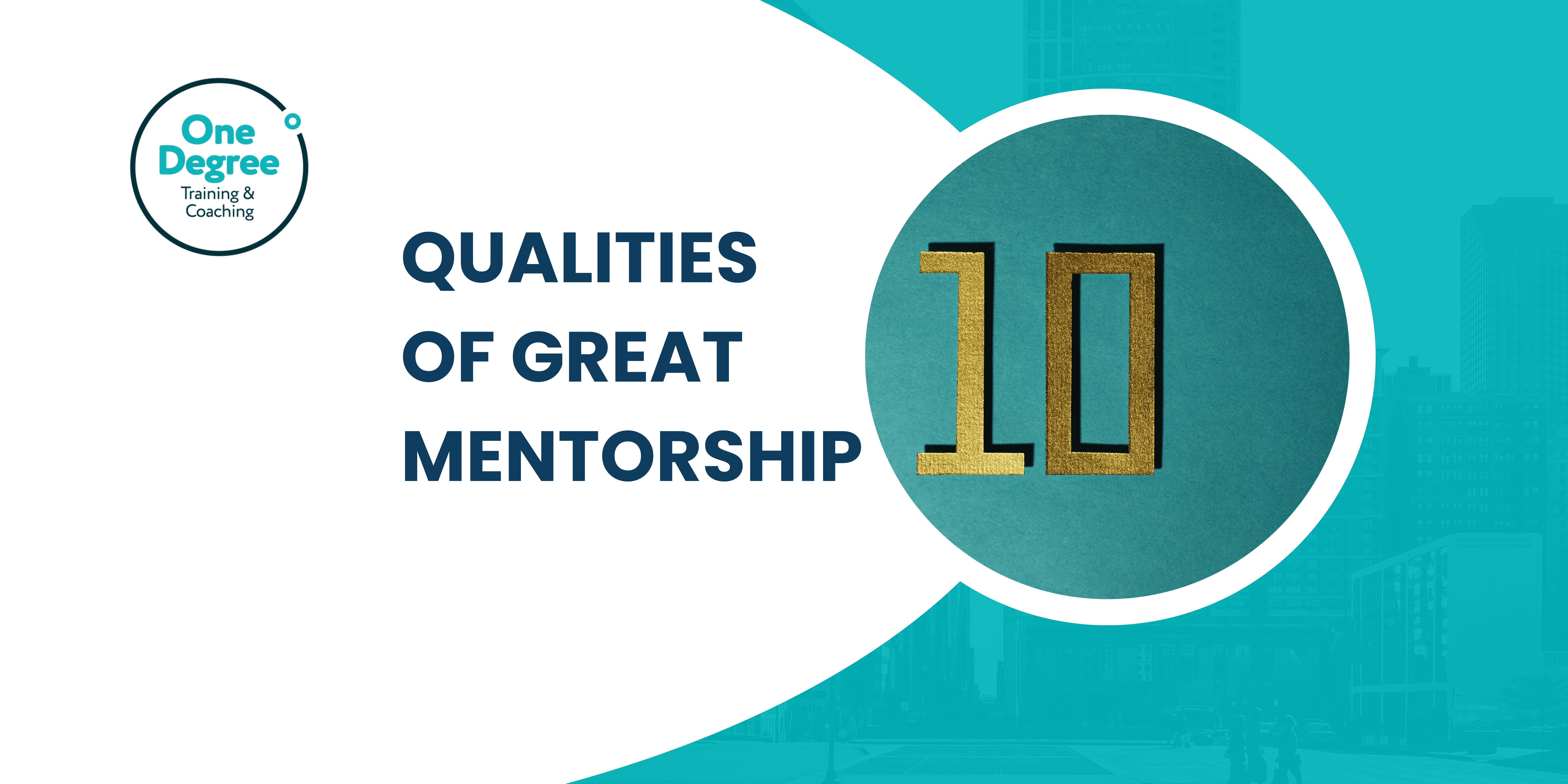Good mentors, like good leaders, can have a lifelong impact on their mentees. A mentor is someone who’s an expert in the subject area, but it takes far more than expertise to be a good mentor.
There is an abundance of research that demonstrates certain attitudes and personal qualities as being key. For example:
- Passion for learning. The attitude of a mentee is a mirror of the mentor. A good mentor is someone who instils a passion for learning, for this to work, they must demonstrate this same passion.
- Commitment to helping. Personal development doesn’t always work to pre-determined calendar. Whilst scheduling and prioritising mentorship meetings is important, a good mentor is there when the mentee needs them.
- Enthusiasm. Similar to passion, if a mentor isn’t enthusiastic about both the mentoring process, and the subject matter, they won’t generate enthusiasm within the mentee. A lack of enthusiasm very quickly leads to lower prioritisation, lack of achievement and the process failing.
Why is it important to have mentors?
You are not only a role model and a leader, but you also have the knowledge and experience that others look up to and rely on for guidance. That’s a key motivator in itself – however, there are other compelling reasons to better yourself as a mentor.
According to Gallup’s state of the workforce survey in 2022, employers who have an engaged workforce see a ~23% increase in revenue. Not only does mentoring develop skills within your team(s) it helps them feel engaged with and a priority. This leads to higher levels of fulfilment, increased performance, and better customer experiences.
What qualities do all great mentors have in common?
1. Passionate about helping others.
Cast your mind to a time where you were mentored well. The mentor will have made you feel as though you were a priority and they were passionate about your success.
Great mentors will be ready with great advice, but it goes beyond that. They genuinely care of your success and will go out of their way to help you achieve it.
If you’re in an industry that you don’t feel particularly passionate about, that’s ok. It’s the passion about help others achieve their goals that’s important.
2. A great communicator.
This seems like an obvious one, but effective communication is essential for successful mentorship. Mentors need to be able to ask questions and offer advice in a way that’s easily understood by the mentee.
Patience, active listening skills, curiosity, ability to answer questions, provide feedback, and help their mentees find solutions on their own, are all essential for a successful mentorship relationship.
An effective mentoring conversation will see the mentor speaking for around 20% of the time. The other 80% will involve the mentee speaking and periods of quiet reflection to determine the best solutions or actions.
Great communication is a skill in itself; if you find yourself struggling to hold perfect mentoring conversations, don’t worry, it takes practice. What’s important is that you’re there for your mentee. Start with open questions – what, when, where, which, & how – as they’re great initiating a 2-way conversation. “Why” also starts off an open question but should be used with caution. It can come across as argumentative, or accusatory.
Visuals are another great way to enhance the quality of the communication. Drawing diagrams, graphs, pictures, etc., will help more visual people engage more.
3. Guide mentees to answers rather than just telling them.
It’s incredibly tempting to tell people what to do, especially when you’re an expert and know the right answer. That’s not the best approach to mentoring.
Great mentors acknowledge their biases and understand why something’s the right solution is more important that what the solution is. Using open questions, and helping the mentee determine the solution themselves, ensures the mentee will be independent, and not reliant on you to solve all their problems.
This doesn’t mean you can’t share your experiences – you are the expert after all! But do so in a way that compliments their ideas, or leads them to the solution, rather than just telling them what to do.
4. Recognizes the value of mentorship for both the mentor and mentee.
Being a mentor gives you far more than just the satisfaction of developing others. It gives you a chance to develop to.
The great advantage of the younger generations at work, is their curiosity, creativity, and innovation. As you allow them to determine their own solutions, you’re exposed to ideas that your biases may never have let you come up with.
Taking time to reflect on what you can take away from each conversation is essential to continually grow yourself.
5. Gives honest and candid feedback.
Most people, if they’re honest with themselves, find giving constructive feedback difficult. It can be uncomfortable, and can risk tension in the workplace. It’s even harder to give when it’s someone you see on a regular basis.
Patience, empathy, and a willingness to explain why that behaviour/decision/action was wrong, will help keep the relationship positive.
When we allow ourselves to fall into the trap of “skipping over” the negative topics, we’re at risk of giving our mentee a false sense of their ability and progression. This can set them up for failure or mean they don’t advance.
It’s incredibly important to be honest at all times.
6. Asks great questions.
There’s a big difference between an open question and great questions. For example: “where do you see yourself in 5-yrs?”, is an open question, it’s also such a typical one that it tends to be met with basic answers.
An approach such as: “imagine you’re 80-yrs old, where are you? What are you doing? What did you do to get there? From where you are now, what’s the next step you need to take to make that happen?”, tends to tap into possibility thinking and a more genuine connection with the process.
As a mentor, curiosity, patience, and not needing to get to the point with one question is key to help your mentee become creative in their answers.
7. Shares their knowledge and experience.
Everyone is inflicted with things like imposter syndrome from time to time. If that’s the case when you’re a mentor, you’re actually taking significant value away from your mentee.
There’s a reason why you’re a mentor – especially if you were chosen by your mentee. You have valuable life experience, professional experience, and knowledge the mentee needs to develop and reach their full potential. Sharing your experiences and knowledge enriches the experience for the mentee and makes the process so much more personable.
8. Withhold judgment; seek understanding.
When you’re a mentor to someone who isn’t taking the agreed upon actions, it’s very easy to become frustrated. This frustration can lead to judgement and be detrimental to the ongoing relationship.
By seeking to understand with compassion and empathy, we can make reasonable adjustments to the process to ensure it works for both parties.
9. Understands the power of relationships.
It’s unlikely that you’re an expert in everything that your mentee needs support in. A great mentor understands that a mentee may need several mentors to develop in different ways.
By fostering relationships, and connecting your mentee with other experts, you’re giving them the best opportunity to reach their full potential.
10. Always takes responsibility for their actions.
An unfortunate truth is that human beings are far from perfect.
We make mistakes, errors in judgements, missteps. Being a great mentor isn’t about being perfect all the time. That would be impossible.
Taking ownership of your mistakes serves as great role models for mentees. Remaining accountable and honest when things don’t go according to plan, is crucial for demonstrating the vulnerability needed for effective mentorship and gives the mentee confidence to follow suit.





